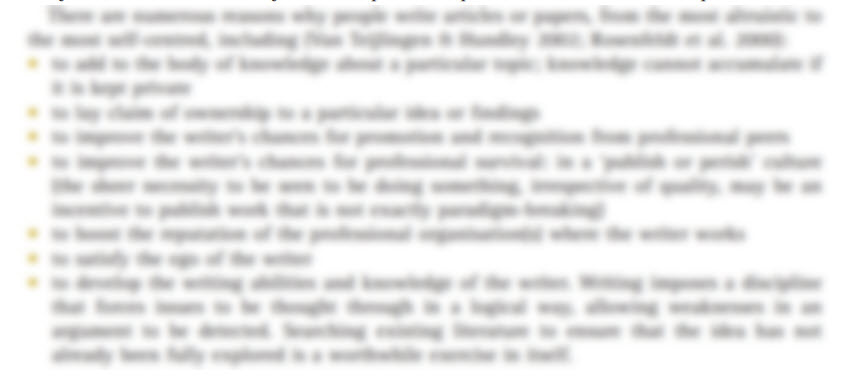Designing, executing and writing up a PhD study takes a large chunk of your time and energy. Here is an overview of each stage of the PhD journey, along with links to excellent articles that will help you along the way. Some of the advice offered here may be specific to a discipline, country or university, or may be heavily dependent upon some author’s experience and background. Nevertheless, you are likely to find most of this advice and instruction helpful.
It is important to seriously consider why you are undertaking a PhD and what you hope to achieve by completing a PhD. Completing a PhD can be extremely useful even for those who may not continue doing research later on.
2. Write a research proposal
You might be offered a PhD project where the research proposal is already planned or you might need to devise a research proposal yourself, either before or after you have chosen a supervisor. This proposal and confirmation of candidature will need to be approved by your university’s research committee.
3. Choose a PhD supervisor
Some students have one key supervisor with one or two additional supervisors, while it is not unusual for some students to have three or four. It is important to remember that your supervisor may have many students under their direction, so their time may be strictly limited. At Monash University, research supervisors receive accreditation training.
4. Design your project budget
An essential project management skill when conducting research is the ability to effectively design and manage research budgets. If you need to request finances through a grant application, ensure you thoroughly investigate the necessary guidelines.
5. Start writing in the early stages of your project
Don’t wait until you have collected and analysed your data before you start writing. Most universities encourage students to write about their project while they are conducting their research. Project proposals can be rewritten and methods sections developed as data is collected and analysed. Literature reviews can be updated and conference talks and posters can be prepared even before you have started to collect data.
6. Consider the structure and the format of your thesis
Exactly how to structure and format your thesis will vary greatly depending upon your project, your discipline, your department and your university and your discipline. Always refer to your university’s guidelines for thesis format requirements. For example:
How to find completed PhD theses
It is always a good idea to check other PhD theses that are similar to your topic, have been completed recently and have been produced by your university department. You can gain a wealth of ideas about structure, size and overall thesis design.
And on this page, there are other useful inks:
* Australian & New Zealand Universities – Institutional Repository Contacts
How to write a literature review
Reviewing the literature is important to assist your knowledge and understanding of your topic and integral to establishing your position in the academic landscape. Writing good literature reviews is crucial to show your examiners how well you know the literature and how well you are able to explain the importance of your project. It is a common requirement that you write a separate chapter as a stand-alone literature review. However, for those theses that are predominantly composed of complete published papers, there might not be a requirement for a separate review section.
7. Get feedback on your writing
In addition to your supervisor, seek feedback on different aspects of your writing from appropriate advisors: accuracy, clarity and brevity. Increasingly, projects are written for a variety of aim to get academic audiences so ensure that your writing is clear and succinct.
* Getting Feedback – University of North Carolina (USA)
8. Learn how to publish peer-review papers
Increasingly, students are expected to submit a large proportion of their thesis as published papers. Not every PhD project can be easily prepared as separate papers; however, remember to look at recently submitted theses within your discipline and within your department to see how people have completed their thesis.
9. Submit your thesis
The process of submitting your thesis may include preparing additional tasks and preparation of paperwork (i.e. the Originality Statement).
10. Understand the examination process
Usually there are three examiners. However, the process of thesis examination will vary widely according to discipline and university. Broadly speaking, your examiners will recommend that your thesis be accepted without alteration, accepted with minor alteration, accepted providing major changes are made or rejected. Usually your supervisor will choose who your examiners are and you may have the opportunity to choose one of your examiners.
If there are any problems...
Most problems with your project are surmountable and remember that your supervisors and your university are there to help you. If things go drastically wrong at any time, it is essential that you seek assistance as early as possible. There are people within your university administration who are there to help you. To help dealing with problems, document any issues as they arise. It is essential for you to have excellent time-management and record-keeping skills.
and remember...
© Dr Marina Hurley 2019 www.writingclearscience.com.au
Any suggestions or comments please email info@writingclearscience.com.au
Find out more about our new online course...
Now includes feedback on your writing Learn more...
SUBSCRIBE to the Writing Clear Science Newsletter
to keep informed about our latest blogs, webinars and writing courses.
FURTHER READING
- Should we use active or passive voice?
- 10 writing tips for the struggling ESL science writer
- Co-authors should define their roles and responsibilities before they start writing
- How to write when you don’t feel like it
- When to cite and when not to
- Back to basics: science knowledge is gained while information is produced
- How to build and maintain confidence as a writer
- What is science writing?
- 8 steps to writing your first draft
- Two ways to be an inefficient writer
- Work-procrastination: important stuff that keeps us from writing















